MARITIME AQUARIUM
We had the good fortune to do a sleepover in Connecticut’s Maritime Aquarium. We didn’t get much sleep, but we enjoyed the experience! The aquarium focuses on the marine life of the Long Island Sound.
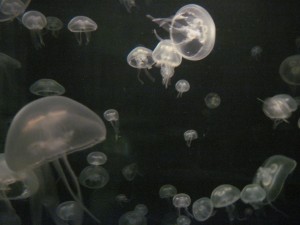
SHARK TANK
The big draw for a lot of kids is the shark tank – it’s the largest tank in the aquarium, holding 110,000 gallons. It has 8 sharks. They keep the temperature constant at 63-65 degrees, so the sharks don’t know about seasons, for mating. The sand tiger sharks are around 8 feet long. Boy sharks have claspers near the anal fin (guess why?).

Our guide told us about a 9 foot female shark they used to have, that swallowed whole a 5 foot shark a few years ago, during a Girl Scout camp-in. Glad we weren’t there. Another time the same shark tried to eat a bigger one, but the meal got stuck in its throat and they both died. Baby sharks aren’t kept in the tank because the adults would eate them. If you’re wondering why the sharks don’t eat the smaller fish in the tank, it’s because the sharks are well-fed (you can watch them feed the sharks with long sticks – they put the stick with a dead fish attached, and keep track of which sharks have eaten). In the wild, sharks eat every one or two weeks. Here they’re force fed more often so they won’t eat the fish in the tank. To move the sharks in, they use a freight elevator and sling/stretcher.
HORSESHOE CRABS
The kids loved looking at the horseshoe crabs. You can tell the male from the female, because male has what looks like a boxing glove on its front claw. They’re 350-400 million years old (as a species, not the ones we looked at!) – and are older than dinosaurs. They have blue blood that’s good for medical use – researchers drain up to 25% of the horseshoe crab’s blood, and turn it into powder lysate. The horseshoe crabs only live on the U.S. East Coast, with another version in Japan (they’re scarce there).
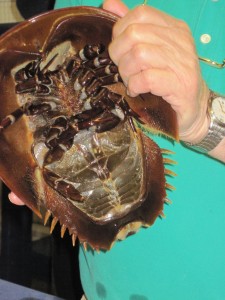
SEALS
The majority of kids loved the seal show, where the trainer fed them and had them do some tricks. I missed most of this because my son didn’t want to watch, and I needed to stay with him.
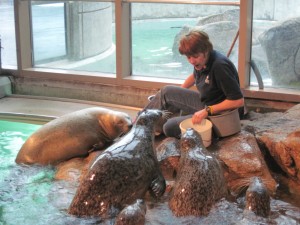
OCTOPUS
Their octopus is 2 years old. They give it an empty peanut butter jar with a crab inside, and holes in the lid. The octopus can figure out how to open the lid to get the crab out. Years before, one octopus figured out how to open the toggle outside the tank, and it climbed out, and fell. It died.
TURTLES
Their loggerhead turtle weighs 150 pounds, and they have 2 younger greenbacks. They can live more than 100 years.
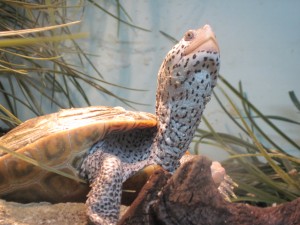
TOUCH TANK
You can touch sting rays with their stingers removed.
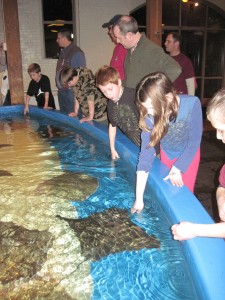
FROGS
We loved the frog area – a huge variety of them!
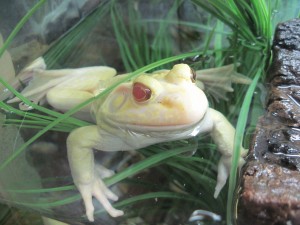
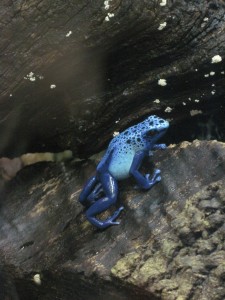
BREEDING
You can see some of their breeding tanks, with jellyfish grown from polyps. They grow coral and move animals into other tanks (or give them to another aquarium) when they outgrow their old tanks.
OTHER ACTIVITIES
You can sometimes make a toy boat for $5. They have an IMAX theater. They had a special exhibit with meercats. Not sure how that relates to an aquarium, but they’re cute. The aquarium also has a great play area on the second floor with soft blocks the kids can use for building. They also have some boats to look at. Outside you can see the penguins, including a large fake penguin (good for photos).
IF YOU GO
Where: Maritime Aquarium at Norwalk, 10 North Water Street, Norwalk, CT
Cost: Packages vary, but basic aquarium admission is $13/adults, $10/child.
What’s nearby: There’s a cute downtown with lots of restaurants.
Like this? Become a friend of Jersey Kids on Facebook.

3 Replies to “Review: Maritime Aquarium, Norwalk CT – Taking the Kids”
Comments are closed.